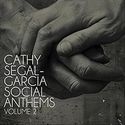|
It's time for a break from this column's usual focus on recordings of musical theatre songs (new and old) and vocalists mostly covering classics from the mid-20th century Great American Songbook. Here are five women with releases concentrating on pop hits introduced in the last 60 years. We start with Lena Hall, remarkable for her burning belt of a voice, contrasting with the next item by the pillow-soft sound of minimalist Diana Panton. The 1970s are recalled by Elaine Dame with Reminiscing, named for the oldie that also shows up on the new offering from Bonnie J Jensen, who, like the last woman in the line up, Cathy Segal-Garcia, includes two originals.
 LENA HALL LENA HALL
BEST OF OBSESSED
Ghostlight Records
Digital
To say that Broadway veteran Lena Hall's approach to covering hits of the last several decades is intrepid and intense or that the wham of her powerhouse vocals can't be overestimated are understatements. This formidable and fearless performer often pulls all the stops out as she blasts out notes and roars through rock and roll. The collection rhymingly called Best of Obsessed culls cuts from her earlier series of EPs presenting strong, stripped-down salutes to major rock acts, plus two newly recorded items.
Included are two things from the musical Hedwig and the Angry Inch, in which she's played both lead roles, winning a Tony Award for her work in the revival. Best of... boasts compelling performances of the score's "Midnight Radio" and "The Origin of Love." Among the 14 picks, there's a large amount of big-voiced work, which can be extra searing and/or excitingly soaring. The sound can be a harsh howl at high volume for Nirvana's "Smells Like Teen Spirit" and other picks, but some are more tempered, although the images can be harrowing and not for the faint of heart. "Zombies" is one example, examining the haunting horrors of actual killings in a war, an unblinking drama recorded by The Cranberries, written by group member Dolores O'Riordan. Violence rears its vile head also in "Love Interruption" by Jack White, with unsettling lines such as "I want love to grab my fingers gently, slam them in a doorway, put my face into the ground/ I want love to murder my own mother and take her off to somewhere like hell or up above."
The singer seems game to unleash any emotion, but it's not steady sturm und drang. A more lighthearted moment comes with Beck's "Think I'm in Love" with its key repeated reaction "I think I'm in love, but it makes me kinda nervous to say so." Also welcome is a straightforward version of the electrifying Elton John standby about gratitude and relief, "Someone Saved My Life Tonight" (inspired by his youthful post-panic connected close calls with getting married and considering suicide, although the lyric is by his longtime collaborator Bernie Taupin).
David Bowie's legacy is represented twice; there's "Rebel Rebel" and an especially exciting "Life on Mars" with dazzling sustained notes. It's one of the two previously unreleased recordings. The other is "Burn the Witch," suitably scorching, and an unabashedly forceful cry from the force of nature named Lena Hall. It's one of three bold takes on songs from Radiohead (the others are this 14-song release's first and last tracks: "Creep" and "Street Spirit (Fade Out)"). The singer heads back to Radiohead repertoire when she joins other women in a tribute show to that English band at Le Poisson Rouge in downtown Manhattan on October 6th.
 DIANA PANTON DIANA PANTON
SOFT WINDS AND ROSES
Digital | CD
The name of Canadian singer Diana Panton's most recent album, Soft Winds and Roses, is plucked from the words that follow the title line in the included number "Pussywillows, Cat-Tails." And the tactile experience involving what's named by any of those four plural nouns evokes the disarmingly delicate touch and timbre that are trademarks of this interpreter's approach. The gentleness is sweetly soothing in her guileless embraces of pop, folk, bossa nova, and rock (soft rock, of course, for the Soft Winds... lady). Complementing the intimacy of her cozy communications and ruminations, the instrumental accompaniment totals just two musicians. They are her frequent colleagues, guitarist Reg Schwager and Don Thompson who plays piano, bass and vibes. Thompson also did the supportive arrangements that are simpatico with the various reactions to romantic attractions: sensitivity, innocence, awe, and being rejected.
The 14 selections are programmed so that the order of the tracks track a possible love connection, commencing with shyly approaching the object of one's affection (Elton John's early success, "Your Song"), turning to more direct yearning and hopeful hoping, moving on happily to the bliss of blossoming requited relationship ("And I Love You So"), leading up to the bubble-burstings of break-ups ("Hey, That's No Way to Say Goodbye"). The heart can break quietly. The reserved, "less-is-more" approach to the lonely laments, with a sighing wistfulness instead of woe-is-me weeping generally engenders sympathy for a fragile soul. While the fires of passion and despair may stay at kind of the same low flame, the consistent tenderness charms in these chapters charting lovers gradually coming together and parting. Particularly moving is "A Wish (Valentine)" by composer Fred Hersch and lyricist Norma Winstone ("No hearts, no flowers at my door/ No cards from someone I adore/ And yet it seems you are the focus of my dreams/ I only wish that I could be your valentine").
Diana Panton makes the material her own, projecting in all the numbers what seems to be the same believable woman who believes in love. How can it be that the Bee Gees' query, "How Deep Is Your Love?" seems to take on a deeper meaning? At a more relaxed pace, she lingers over lines that may have been lost in the original hit records's earwormy nature, plush production, and harmonies. Her involved, serious attention to the words makes us take seriously the line that could be a throwaway: "I really mean to learn." And when she takes on two of Brazil's bossa novas ("Sweet Happy Life" and "You and I," both with English lyrics by Norman Gimbel), the points of view are not overwhelmed by overemphasizing the genre's typical infectious sway that can make listeners simply blithely nod along. A final, matured perspective ends the ride through the tunnel of love (and life) with "Both Sides Now."
Surveying Soft Winds and Roses, one finds that Diana Panton's understated impact and skill are, to borrow the title of her selection from the discography of The Beatles, "Here, There and Everywhere."
 ELAINE DAME ELAINE DAME
REMINISCING
Digital | CD
Welcome back to the 1970s. Chicago-based song interpreter Elaine Dame refreshes nine samples of that decade's pop fare–with flair. Whether mellow or muscular, the musical reupholstering on Reminiscing is ear-pleasing, thanks in no small part to the arrangements she and Chris Madsen, the core quartet's sax player, co-created. In addition to piano (Tom Vaitas), bass (Sam Peters), and drums (Jon Deitemyer), there are a few guest musicians who make brief appearances on guitar or trumpet. While some of settings are closer to the hit versions and coast comfortably on the nostalgia wave, others experiment satisfyingly with tempo and ambiance.
The more snail-paced picks let a listener revel in the prettiness of her legato lines. "Midnight at the Oasis," born in the slow lane, is even more languid. At six and a half minutes, with embellishments, "Last Dance" eschews the disco portion of Donna Summer's hit, allowing full immersion in a more serious yearning for a "last chance for love." Wisely, the lyric's mentions of being bad and wanting to be scolded are downplayed in this downbeat version and it seems like dancing is also a metaphor for a relationship. And a dreamy "Wish You Were Here" here feels like floating on a cloud, vastly different from the weightier original by Pink Floyd. The requisite sorrow and resignation are palpable in "Nothing Seems to Matter." Feistier entries find the lady strutting and sultry (a funky "Tell Me Something Good" and a slinky "Use Me").
Elaine Dame's program manages to be a double-duty discovery experience, serving two populations: those who can belatedly discover the music of the 1970s if they didn't live and love through that decade; and those who did so. The older folks with these songs in their heads can hear them rejuvenated, rekindling memories. Reminiscing's title number, written by Australian Graeham Goble of Little River Band, is partially about that subject–it's a sweet pop song about popping the question ("I'm talking about a lifetime plan") and itself has references to an earlier era (the standard "Dancing in the Dark," the Glenn Miller band, and Cole Porter). Old songs and the joy of reminiscing never really get "old."
 BONNIE J JENSEN BONNIE J JENSEN
RISE
Digital | CD
The 1978 hit "Reminiscing" is one of the eclectic choices on Rise, the new collection by Australian vocalist Bonnie J Jensen. Also on the subject of reminiscing is "Spain," with its sections that begin with the words "I can remember" or "I can recall" (the latter phrase used as the alternate title when the lyrics were later added). They're tied to the quick, tricky tempo in parts of Chick Corea's composition, and the performer navigates and nails the music's shifts and staccato punches with aplomb and delivers the words with precision. (The booklet's track list doesn't credit singer Al Jarreau and Artie Maren, who wrote the lyrics sung here, but gives the name of "Spain"'s composer Joaquín Rodrigo, whose classical guitar concerto melody was used as part of Corea's original instrumental recording.)
Throughout the set, the versatile vocalist sounds confident and in the groove. Versatility is shown when she unveils vulnerability in full on the moody final track, mining James Taylor's classic plea, "Don't Let Me Be Lonely Tonight," for neediness and confessions. Singing in French, she takes on "La Belle Dame Sans Regrets" by Sting and Dominic Miller.
Bonnie J Jensen has sole credit for four of the 12 arrangements and collaborated on five others with sax player/flautist Graham Jesse. The two co-wrote the assertive "Spend a Little Time with Me," which also appears on Shimmer, her earlier release. Miss Jensen's own writing and arrangement of "Hughes' Blues" is (I'm assuming) a nod to guitarist Geoff Hughes who's featured on it. The album feels very much like a team effort, as the singer (who, in other ventures, has sometimes been her own pianist) surrounds herself with a solid group of musicians who dynamically do some of the heavy lifting. A prime example of the spotlight-sharing showcases is "Cantaloupe Island," arranged by jazzy Jesse alone and timed at five minutes and 19 seconds. The vocal, employing Mark Murphy's lyric for Herbie Hancock's melody, does not come in for a full minute and then, before we get to the two-minute mark, there's another swinging swath of instrumental playing that goes on for two more minutes before the singer re-enters. A co-composition with Bernie Maupin, Hancock is favored also with "Butterfly," which has a lyric by sister Jean Hancock. Like "Cantaloupe Island" and "Spain," it started off life as an instrumental.
The release of Rise should be a welcome surprise for her fans as this collection is her first issue since 2010; a string of singles from the collection preceded the whole album's August appearance. Unlike some singers who are basically ensconced in Golden Age standards for years and then suddenly switch to more contemporary fare fairly late in their careers–or vice-versa–the four earlier albums in Bonnie J Jensen's discography show that she typically mixed Great American Songbook classics with later pop and jazz. That explains why she seems so comfortable with these diverse diversions.
 CATHY SEGAL-GARCIA CATHY SEGAL-GARCIA
SOCIAL ANTHEMS, VOLUME 2
Dash Hoffman Records
Digital | CD
Back in 2021, when I received and reviewed vocalist Cathy Segal-Garcia's album called Social Anthems - Volume 1, that subtitle felt like a teaser and a promise for more. Well, it took a few years, but the anticipated Social Anthems, Volume 2 came along and it's very much a cousin to the earlier release, with a similar tone, mostly mining familiar post-1960s popular music, four of the same writers represented (Marvin Gaye, Peter Gabriel, Stephen Stills, and herself), and the same two colleagues effectively guesting for one duet each, and Dan Davilla back as executive producer. This follow-up generally measures up to the best tracks of its likewise adventurous, gutsy predecessor with some raw emotions on display in the involved singing.
There's a pervading sense of restlessness and/or frustration evident in the chosen selections. Poverty and prejudice are addressed in both the duet with Mon David, "Living for the City" by Stevie Wonder, and the despairing "Inner City Blues (Makes Me Wanna Holler)" by Marvin Gaye and James Nyx. The latter dates from 1971, but some of the vexations addressed in the lyric feel current: inflation, war casualties, police shootings, and the future being uncertain. It appears in two versions on the album, with the original lament gaining a more immersive contemporary-styled remix.
There are only nine tracks, but all of them are on the long side, clocking in at five minutes-plus each. Throughout the proceedings, singing is fervent, but not flagrantly so. Passion is somewhat tempered by poignancy and pensiveness. Revisiting "Russians," written by Sting (with a little borrowing from Russian composer Prokofiev), which includes the bemoaning line, "There is no such thing as a winnable war," prompts a little adjusting. The singer replaces the names of Khrushchev and Reagan in the 1985 lyric with Putin and Biden as well the interpolation of three appearances of the chorus of Cathy Segal-Garcia's self-penned "My Russia" (which appeared in full on her CD called Secret Life).
Her other original here is "The Beginning of You," one of the examples of the titular category of Social Anthems being, arguably, misleading–as it is not focused on societal unrest or political protest. But "social" could perhaps refer to the interpersonal aspects of a love relationship, with "In Your Eyes" (Peter Gabriel) and the duet with Paul Jost, "The Book of Love" (written by Stephin Merritt, covered notably by Gabriel) being two other examples. Then there's the longest piece, at almost seven minutes, and it is also one of the most appealing. It was written by one famous singer about the ending of his romantic connection with another: "Suite: Judy Blue Eyes" by Stephen Stills, addressed to Judy Collins. It's slowed down here, trading the original's fresh-feeling wounds of sorrow for the sense of emotions more processed and reflective.
As far as the musicians doing the vibrant accompaniment, three bass players and three drummers share the duties, while keyboardist Carey Frank, guitarist Will Brahm, and vibes player Nick Mancini appear throughout and each of them arranged two of the selections. The singer did her own fine arrangement for "The Beginning of You." The Los Angeles-based veteran vocalist/teacher/author continues her live performances and her ongoing series of remote "Noontime Hang" relaxed conversations (available on her Facebook page and Youtube), where she's interviewed more than 600 fellow jazz artists. They share experiences, laughs and perspectives. And her own singing certainly brings interesting perspectives to songs of different decades and genres.
|
|